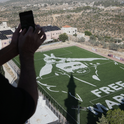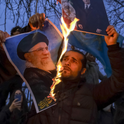In an interview with Fox News on Sunday, Israeli prime minister Benjamin Netanyahu said that Israel’s attacks on Iran could result in regime change in Tehran. This statement underlines that its attack on Iran is happening during an optimal time for Israel. Never in its history has the Islamic Republic been weaker. Israel is taking full advantage of that to eliminate its longstanding enemy.
Israel has been warning about Iran’s destabilising role in the Middle East for decades. During much of this time Tehran posed a formidable threat to Israel’s security, especially through the actions of its proxies in Lebanon and later in Gaza and Syria. The 7th October 2023 Hamas attack sparked Israel to seek to permanently neutralise Iran’s military capabilities.
Since October 2023, Israel has been systematically attacking Iran’s major military assets in the Middle East. It has been striking strategic targets in Lebanon and Syria, which has resulted in the degradation of Hezbollah—Iran’s main proxy in the region. Israel’s military campaign against Hezbollah curtailed the Shia militia’s ability to inflict significant damage on Israel, with Hezbollah’s stockpile of medium- and long-range missiles destroyed.
Meanwhile in Iraq, the majority of the armed groups backed by Iran were pressured (whether by the Iraqi government or by the shifting geopolitical picture) not to be involved in the Iran-Israel standoff. They mostly remained on the sidelines, even as Israel and Iran engaged in a low-intensity direct confrontation in April 2024.
The fact that the Iraqi armed groups prioritised self-preservation over aiding their Iranian patron, coupled with the military degradation of Hezbollah, contributed to the fall of Bashar al-Assad’s regime in Syria, which had partly relied on Iran’s proxies for survival. Assad’s ousting in turn left Hezbollah suffocated, as the group had relied on Syria as a major lifeline for the transfer of money and weapons from Iran.
Although the Houthis in Yemen remain active, Israel and the US have been attacking their major assets, including airstrikes on the port of Hodeida. And Israel is continuing its military campaign against Hamas in Gaza, assassinating most of the Palestinian Islamist group’s leadership.
With its proxies degraded, Iran has been left without its external layer of military protection. Even its international allies have been lukewarm in their support; when Israel destroyed Iran’s Russian-supplied air defences last year, Moscow did not replenish them. Russia is unlikely to go out of its way to support Iran militarily against Israel.
Economic sanctions have put a strain on the ruling regime in Tehran—and yet it continued to fund its proxies at the expense of the Iranian people. This became even more acute as neighbouring Saudi Arabia pursued an ambitious strategy of domestic socio-economic transformation. This presented Iranian citizens with a real example of what top-down reforms can achieve.
But Tehran continued to ignore the needs of its population. And despite Israel displaying its vast military superiority, Iran appeared to believe that its proxies would eventually recover, and continued to try to funnel money and weapons to Hezbollah. The Iranian regime also opted for blindness over Israel’s extensive intelligence ability. This is despite Israel giving a concrete example of its reach inside the country when it assassinated Hamas leader Ismail Haniyeh in July last year by smuggling an explosive device into a Tehran guest house.
The Iranian regime also squandered the opportunity to rescue itself through diplomacy. Seemingly believing it could outsmart the US in nuclear talks, Iran did not comply with the International Atomic Energy Agency’s safeguard obligations and ignored Donald Trump’s 60-day deadline to accept the nuclear deal presented by the US.
All those vulnerabilities, bad choices as well as blind ego by the Iranian regime presented Israel with an unprecedented opportunity to go for the jugular. Israel will not be satisfied with a mere containment of Iran’s ability to threaten it. Israel has a rare opportunity to eliminate the enemy that calls Israel “the Little Satan” and will not stop its campaign until it achieves its goals.
Whether those goals are actually achievable depends to a large extent on US military and political support. It also depends on the resilience of an Iranian regime that has no qualms about sacrificing its people for the sake of survival. Without a clear exit plan Israelis and Iranians, already reporting numerous casualties and damage on both sides, may be facing weeks of back-and-forth attacks. Israel’s operation could become a war of attrition.












